In real life, it’s not so easy. When actors in life’s drama do dumb things, we can’t revise the narrative to avoid disaster.
We’ve all experienced the frustration. We’re reading a book or watching a movie or television show, and one (or several) of the lead characters in the story does something that’s just plain stupid. Blind to the peril before them, unwilling to heed the advice and warnings of others who know better, they rush headlong into danger, placing themselves and their loved ones at risk. We shout at the screen or curse the pages, knowing that terrible consequences will result from this patent idiocy, but on the characters go, compounding foolishness with carelessness and neglect and hubris until calamity befalls them. Deserved calamity. Chickens coming home to roost. Just desserts.
As a writer, I have to guard against doing this. Because the fact is, often bad choices by our lead characters can feed our narratives. “If only Character X would do this, then Characters Y and Z could do THIS, and wouldn’t THAT be cool!” Good editors — and I’ve worked with several — point out these moments and tell me to make certain Character X has a REALLY good reason for doing that not-so-smart thing. Because if they don’t have a good reason, this action will tick off my readers, putting them through that frustration I mentioned above.
And as an editor, I often have to flag moments in the manuscripts of my writers (or my clients) where they have led their protagonists down a foolish path, making them do things that serve the plot but not their own self-interest. “Make sure this is a reasonable, rational course of action,” I’ll say, “because otherwise this moment feels contrived, like something no clear-thinking person would do.”
Usually, in a fiction manuscript, the fix is fairly easy. We can get the characters to where the narrative needs them to be in a way that doesn’t feel so foolhardy and reckless. We can rewrite until it makes sense AND makes for a good story.
In real life, it’s not so easy. When actors in life’s drama do dumb things, we can’t revise the narrative to avoid disaster.
This past week saw climatologists record the four hottest days in human history. Monday’s record global temperature was measured by the U.S. National Centers for Environmental Prediction at 17.01 degrees Celsius (62.62 degrees Fahrenheit), exceeding the previous record, which was set back in August 2016, by about .09 degrees Celsius, or .16 degrees Fahrenheit. That might not seem like a lot, but for global averages that usually vary in tiny increments, this was a significant jump.
Monday’s record lasted one day. Tuesday was hotter. Wednesday was hotter still, and Thursday was even hotter than Wednesday. Thursday’s global average reached 17.23 degrees Celsius, exceeding Monday’s record by nearly .22 degrees Celsius, or more than twice the margin by which Monday’s global average exceeded the old record.
The records don’t end there. June 2023 was the hottest June on record. 2023 is shaping up to be the hottest year in recorded history. The last eight years have been the hottest eight years ever documented. And of the twenty hottest years measured by climate scientists since the mid-19th century, all of them — ALL OF THEM — have occurred in the first twenty-three years of this millennium. Ocean temperatures are at record highs, sea ice volume is at a record low.
Scientists across the globe used words like “terrifying” and “unprecedented” to describe last week’s temperatures, and several pointed out that while measurements of global temperature only go back to the beginning of the Industrial Age, evidence from other climatological data suggests that global temperatures could now be at levels not seen in more than 100,000 years.
And yet, none of the scientists interviewed by the major news outlets seemed overly surprised by what happened last week. Frustrated, yes. Surprised, not so much. And who can blame them?
When I was a senior in college, I took an environmental science class that was geared toward non-science majors: “Major Issues in Environmental Policy,” or something of the sort. During the course of the semester, our professor returned again and again to the threat to the planet posed by global warming and the unchecked increase in greenhouse gases being pumped into our atmosphere by automobiles, power generation, manufacturing activity, industrial agriculture, and other human endeavors. He warned of rising global temperatures and the resulting consequences, which included more extreme weather, greater risk of flooding, drought, and wildfires, shrinking glaciers, rising sea levels, etc., etc., etc.
Everything he predicted in that class has come to pass. Everything.
I took the class in 1985.
To be clear, last week’s record-setting heat was caused by a combination of factors, some related to human actions, others naturally-occurring. The spike in global temperatures resulted from a confluence of decades of climate change and the warming effect of this year’s powerful El Niño, a cyclical climate fluctuation caused by warmer than average currents in the Pacific. But researchers believe El Niño and its sister phenomenon, the climate cooling La Niña, have been occurring for thousands of years. Human-induced climate change in the X factor here.
And we, I am sorry to say, are the infuriatingly myopic characters I mentioned at the outset of this piece. We have been warned of the danger facing us time and again by people who know better — by climate experts, by NASA, by NOAA, by the Intergovernmental Panel on Climate Change, by the World Meteorological Organization, by a scientific community desperate to head off looming cataclysm. For half a century or more we have been told that this day would come, that our planet is hurtling toward a crisis from which it may not be able to recover.
We have delayed and denied. We have made excuses and engaged in the worst sort of incrementalism. We have watched as “once in a century” storms become routine, as horrifying wildfires blacken our landscapes and turn our skies apocalyptic shades of orange and brown. We have ignored all the warnings, and have thus saddled our children and generations to come with the responsibility of cleaning up our mess.
The events of last week merely confirmed what climate scientists have known for some time now. Climate disaster isn’t our future, it’s our present. It is here. At this point, knowing all we do, there is no good reason to ignore the science. Our own self-interest dictates that we must take action now. Because unless we, the characters in this tragedy, act immediately to change the course of humanity, to convince our political leaders that we care about our land, our water, ourselves, our children, our grandchildren, we will destroy the earth. An act of foolishness, of hubris, of neglect and carelessness and ultimate stupidity.
And who will be left to curse the pages of human history?









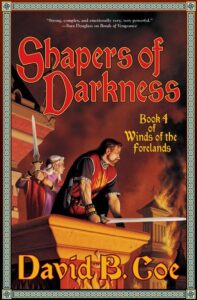 I am currently reading through my Winds of the Forelands series, editing OCR scans of the books in order to re-release them sometime in the near future. Winds of the Forelands was my second series, a sprawling epic fantasy with a complex, dynamic narrative of braided plot lines. At the time I wrote the series (2000-2006) I worked hard to make each volume as coherent and concise as possible. Looking back on the books now, I see that I was only partially successful. I’m doing a light edit right now — I’m only tightening up my prose. The structural flaws in the series will remain. They are part of the story I wrote, and an accurate reflection of my writing at the time. And the fact is, the books are pretty darn good.
I am currently reading through my Winds of the Forelands series, editing OCR scans of the books in order to re-release them sometime in the near future. Winds of the Forelands was my second series, a sprawling epic fantasy with a complex, dynamic narrative of braided plot lines. At the time I wrote the series (2000-2006) I worked hard to make each volume as coherent and concise as possible. Looking back on the books now, I see that I was only partially successful. I’m doing a light edit right now — I’m only tightening up my prose. The structural flaws in the series will remain. They are part of the story I wrote, and an accurate reflection of my writing at the time. And the fact is, the books are pretty darn good. But when I hold Winds of the Forelands up beside the Radiants books, or the Chalice War novels, or even my Islevale Cycle, which is my most recent foray into big epic fantasy, the older story suffers for the comparison. There are so many scenes and passages in WOTF that I could cut without costing myself much at all. The essence of the storyline would remain, and the reading experience would likely be smoother and quicker. — Sigh — So be it.
But when I hold Winds of the Forelands up beside the Radiants books, or the Chalice War novels, or even my Islevale Cycle, which is my most recent foray into big epic fantasy, the older story suffers for the comparison. There are so many scenes and passages in WOTF that I could cut without costing myself much at all. The essence of the storyline would remain, and the reading experience would likely be smoother and quicker. — Sigh — So be it.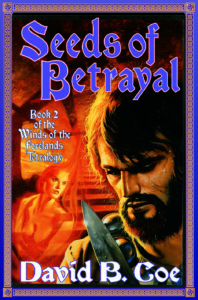 I have spoken before about the recurring problem I have with manuscripts at about the 60% mark. For those unfamiliar with the phenomenon, which afflicts many writers — not just me — it is fairly simple to explain. When I write a novel, I tend to make fairly steady progress until I approach the final third of the narrative. At that point, I run into a wall. And this has been true from the very start of my career. I didn’t recognize the pattern until one afternoon, while working on my fourth or fifth book. I came downstairs after a frustrating day, and Nancy asked me how my novel was coming.
I have spoken before about the recurring problem I have with manuscripts at about the 60% mark. For those unfamiliar with the phenomenon, which afflicts many writers — not just me — it is fairly simple to explain. When I write a novel, I tend to make fairly steady progress until I approach the final third of the narrative. At that point, I run into a wall. And this has been true from the very start of my career. I didn’t recognize the pattern until one afternoon, while working on my fourth or fifth book. I came downstairs after a frustrating day, and Nancy asked me how my novel was coming.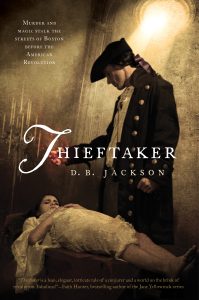 First, though, it occurs to me that in writing about openings last week, I left out one crucial, but easy-to-describe story element: “the inciting event.” The inciting event of your narrative is, quite simply, the thing that jump-starts your story, that takes the characters you have introduced in your opening lines from a place of relative stasis to a place of flux, of change, of tension and conflict and, perhaps, danger. It is the commencement of the narrative path that will carry your characters through the rest of the story. In his description of the Hero’s Journey, Joseph Campbell referred to the inciting event as the “Call to Adventure.” If you’re looking for examples, think of the arrival of the first letter from Hogwarts in Harry Potter and the Sorcerer’s Stone, or the appearance of Gandalf at Bilbo Baggins’s door in The Hobbit. In pretty much all the Thieftaker books and stories, it is the arrival of whoever Ethan’s new client will be for that episode.
First, though, it occurs to me that in writing about openings last week, I left out one crucial, but easy-to-describe story element: “the inciting event.” The inciting event of your narrative is, quite simply, the thing that jump-starts your story, that takes the characters you have introduced in your opening lines from a place of relative stasis to a place of flux, of change, of tension and conflict and, perhaps, danger. It is the commencement of the narrative path that will carry your characters through the rest of the story. In his description of the Hero’s Journey, Joseph Campbell referred to the inciting event as the “Call to Adventure.” If you’re looking for examples, think of the arrival of the first letter from Hogwarts in Harry Potter and the Sorcerer’s Stone, or the appearance of Gandalf at Bilbo Baggins’s door in The Hobbit. In pretty much all the Thieftaker books and stories, it is the arrival of whoever Ethan’s new client will be for that episode.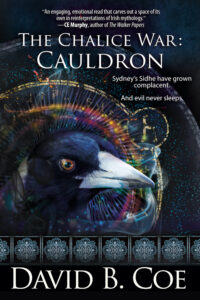 Let’s start with the obvious:
Let’s start with the obvious: 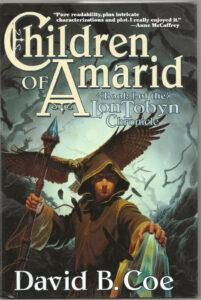 I’m asked quite often if I still feel the thrill of seeing a new book in print, even after so many years and so many releases. And the truth is, I do. Sure, the very first time was unlike anything I’ve experienced since. I still remember getting a call from the local bookstore here in our little college town. My author copies hadn’t arrived yet, so when the store manager reached out to let me know the hardcover edition of Children of Amarid was in stock, I rushed over to see it. I’m pretty sure Nancy came with me.
I’m asked quite often if I still feel the thrill of seeing a new book in print, even after so many years and so many releases. And the truth is, I do. Sure, the very first time was unlike anything I’ve experienced since. I still remember getting a call from the local bookstore here in our little college town. My author copies hadn’t arrived yet, so when the store manager reached out to let me know the hardcover edition of Children of Amarid was in stock, I rushed over to see it. I’m pretty sure Nancy came with me.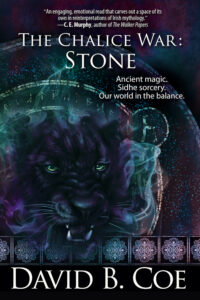 With all this in mind, I am happy to say that the releases of The Chalice War: Stone and The Chalice War: Cauldron have gone great. No new pandemics. The stock market is up. The art work looks marvelous. All the chapters are just where they should be. (I think — I should probably check to be sure . . . . Yep, they look great!) Sales? I have no idea at this point. It’s too early to know. Reviews? We’ll see about those as well. I worry, of course. I want these books to succeed. I want you to like them. And, if you do, I would love for you to tell the world.
With all this in mind, I am happy to say that the releases of The Chalice War: Stone and The Chalice War: Cauldron have gone great. No new pandemics. The stock market is up. The art work looks marvelous. All the chapters are just where they should be. (I think — I should probably check to be sure . . . . Yep, they look great!) Sales? I have no idea at this point. It’s too early to know. Reviews? We’ll see about those as well. I worry, of course. I want these books to succeed. I want you to like them. And, if you do, I would love for you to tell the world.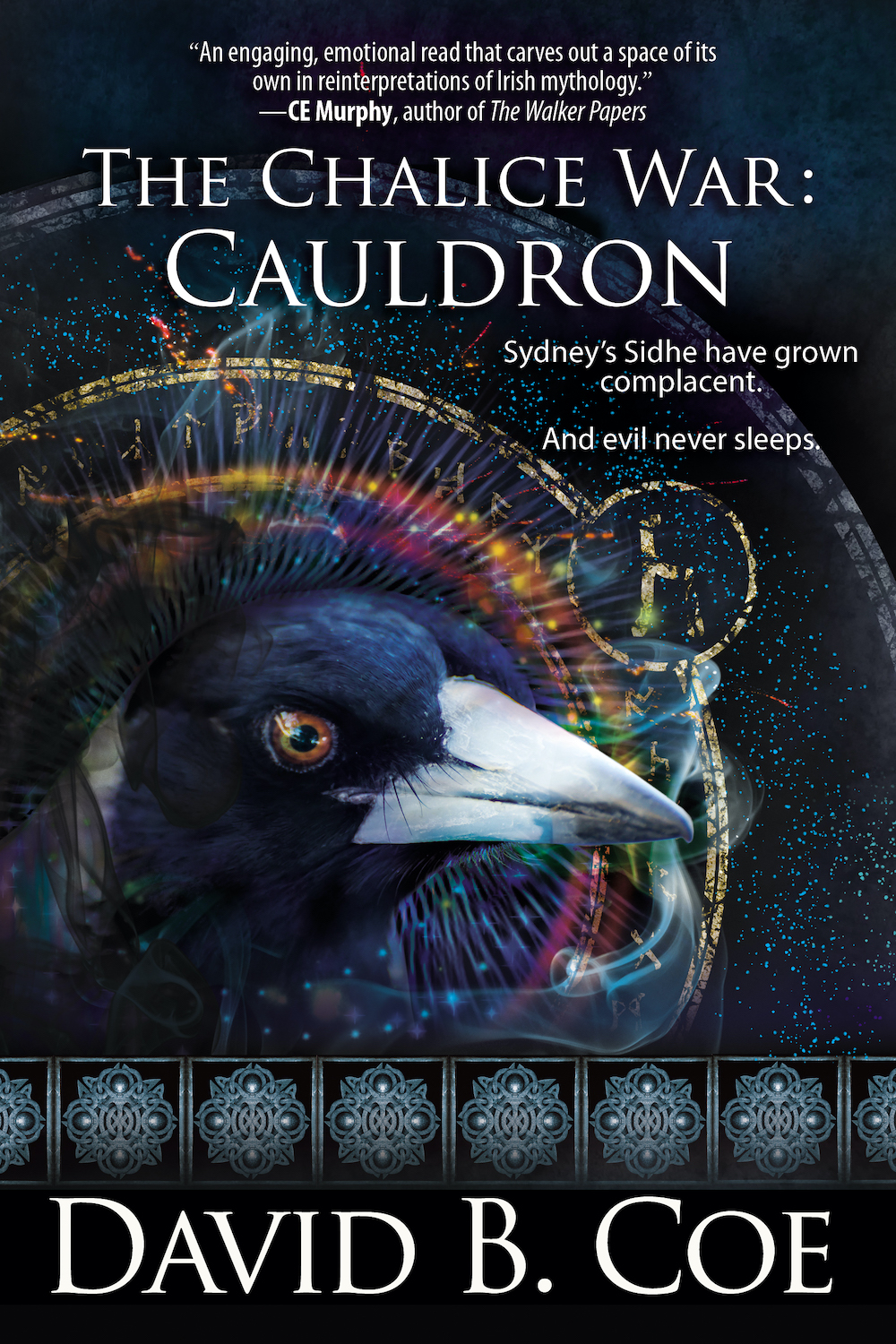 This Friday — the day after tomorrow!! —
This Friday — the day after tomorrow!! — 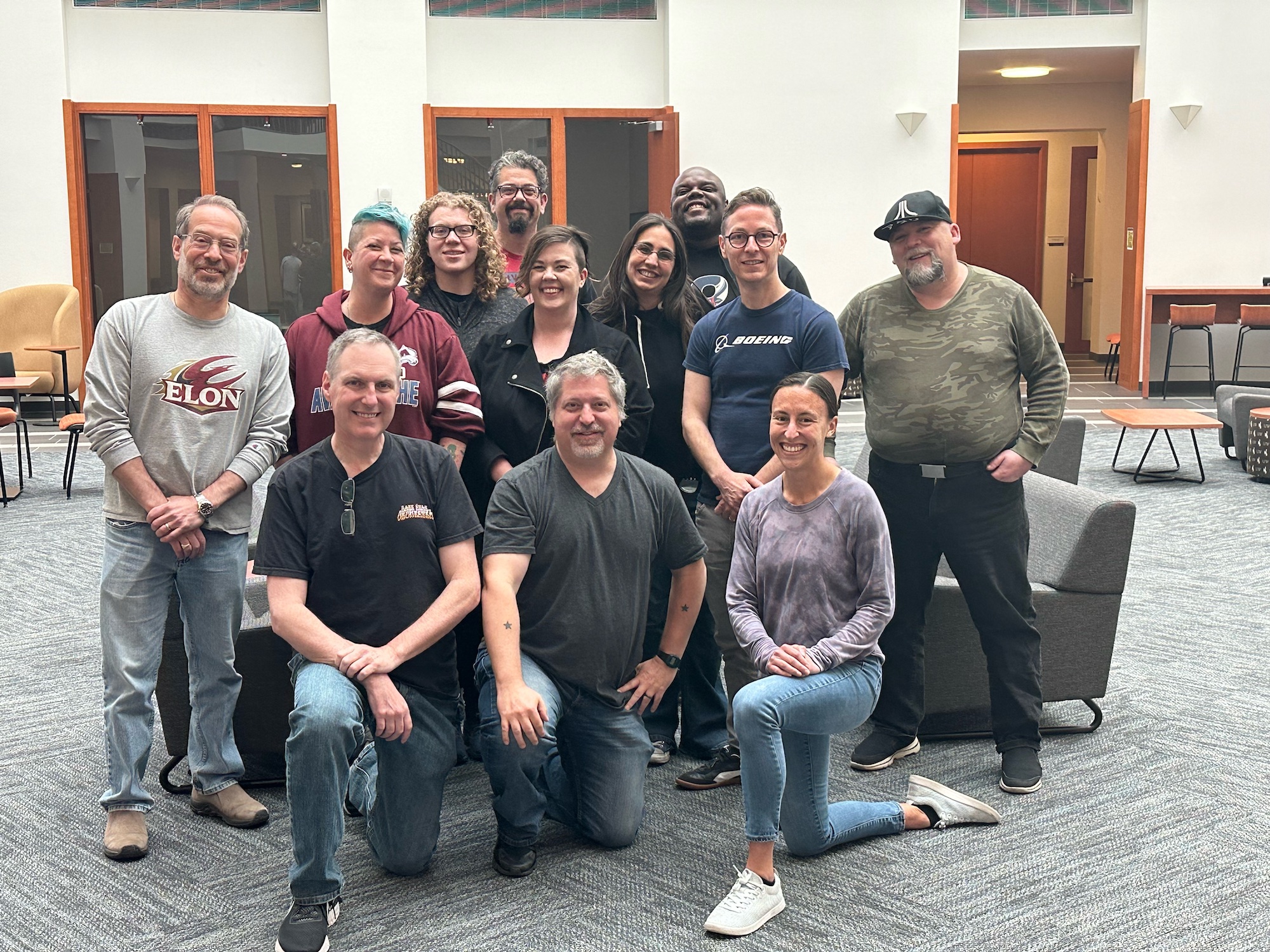 I applied for the workshop back in March, and was fortunate to be accepted along with a group of eight other writers, all of them intelligent, inquisitive, totally engaged, and eager to learn. It was an amazing week, filled with fascinating lectures, wide-ranging discussions, and very cool demonstrations. We learned a ton, laughed even more, and benefitted from the awesome knowledge and enthusiasm of our three teachers. The weather in Wyoming was a bit uncooperative, denying us the opportunity to spend an evening looking through telescopes, but otherwise the week was all we could have hoped for.
I applied for the workshop back in March, and was fortunate to be accepted along with a group of eight other writers, all of them intelligent, inquisitive, totally engaged, and eager to learn. It was an amazing week, filled with fascinating lectures, wide-ranging discussions, and very cool demonstrations. We learned a ton, laughed even more, and benefitted from the awesome knowledge and enthusiasm of our three teachers. The weather in Wyoming was a bit uncooperative, denying us the opportunity to spend an evening looking through telescopes, but otherwise the week was all we could have hoped for.


 On the other hand, do trust in your story ideas. All of them. Even the old ones that haven’t yet gone anywhere. At some point, you’ll have an idea for a story about three kids living in the subway tunnels beneath New York City. And you won’t have any idea what to do with it. You’ll give up on it. Don’t. It will become Invasives. At another time, you’ll write a story about two women interacting with Celtic deities and trying to protect an ancient, transcendently powerful magical artifact. That one, too, will seem to languish. Trust the story. That book just came out. It’s called The Chalice War: Stone. Believe in your vision.
On the other hand, do trust in your story ideas. All of them. Even the old ones that haven’t yet gone anywhere. At some point, you’ll have an idea for a story about three kids living in the subway tunnels beneath New York City. And you won’t have any idea what to do with it. You’ll give up on it. Don’t. It will become Invasives. At another time, you’ll write a story about two women interacting with Celtic deities and trying to protect an ancient, transcendently powerful magical artifact. That one, too, will seem to languish. Trust the story. That book just came out. It’s called The Chalice War: Stone. Believe in your vision.